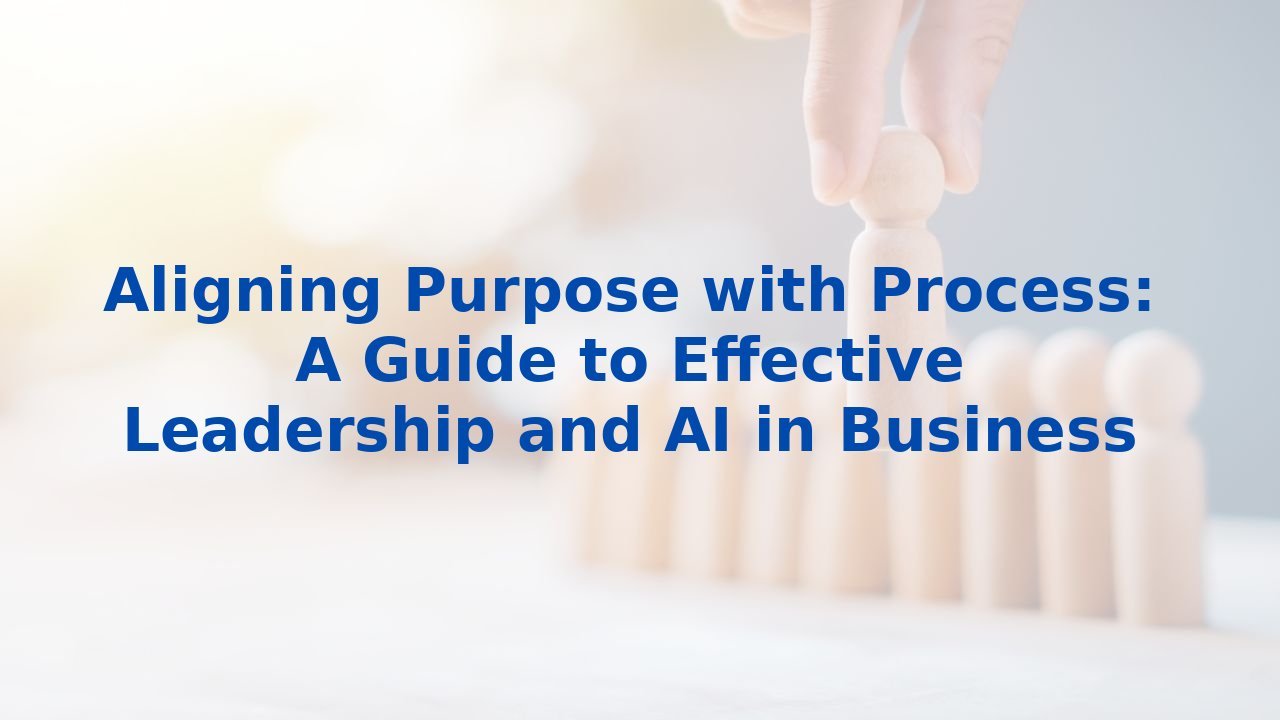Aligning Purpose with Process: A Guide to Effective Leadership and AI in Business
Aligning Purpose with Process: A Guide to Effective Leadership and AI in Business
Introduction
In a world where adaptability is key, organizations have a relentless pursuit of efficiency and innovation. As businesses strive to refine their operations and elevate decision-making, one transformative force stands out — Artificial Intelligence (AI). This game-changing technology not only promises to automate mundane tasks but also enhances overall productivity. In this guide, we will explore how aligning purpose with streamlined processes, driven by AI, sets the stage for exceptional leadership and operational excellence.
1. Improving Meetings
Meetings are integral to business communication, but they often become a vortex of inefficiency. AI has the potential to transform this experience by minimizing the burden of scheduling, note-taking, and summarization. Consider the impact of AI-powered assistants that effortlessly coordinate schedules or tools capable of summarizing vital meeting insights. This shift not only saves time but also allows team members to focus on what truly matters — genuine collaboration and innovation.
2. Enhancing Sales and Marketing
The integration of AI in sales and marketing processes provides insights that significantly boost performance. With advanced analytics at their fingertips, sales teams can pinpoint high-value customers, directing their efforts precisely where they yield the best results. AI-driven chatbots are revolutionizing customer interactions, offering 24/7 support and addressing common inquiries efficiently. By harnessing AI, businesses can drive revenue growth and expand their market presence while concurrently enhancing the customer experience.
3. Assessing and Improving Customer Service
Customer service is the backbone of any thriving business, and AI can revolutionize how service quality is assessed and improved. Advanced AI algorithms can analyze customer interactions, identifying potential areas for improvement or concerns before they escalate. When human representatives are empowered by AI to ensure quality interactions, customer satisfaction skyrockets, leading to loyalty and long-term success.
4. Optimizing Product Development
In the fast-paced domain of product development, AI introduces a game-changing element through generative design. By inputting design goals into an AI framework, organizations can explore an array of design alternatives rapidly, avoiding costly prototyping phases. This accelerated innovation cycle not only conserves resources, but it dramatically enhances time-to-market strategies. It's about more than just efficiency; it’s about unlocking creative potential and delivering value quickly.
5. Automating Content Generation
Content is king in today’s digital landscape, and AI equips organizations with the power to generate compelling narratives with remarkable speed. AI content-generators can produce thousands of lines of text in mere moments, maintaining message consistency across platforms. By streamlining content creation processes, organizations can maximize their outreach without sacrificing quality, ultimately establishing a stronger brand presence.
6. Enhancing Business Process Management
The field of Business Process Management (BPM) is undergoing significant transformation as AI enhances its efficiency. With capabilities for real-time analysis and monitoring, AI algorithms analyze historical data to identify trends and inefficiencies. This intelligent modeling allows companies to simulate and predict outcomes, significantly boosting operational effectiveness. Companies are empowered to make informed decisions that align with their strategic objectives.
7. Automating Routine Tasks
For many organizations, the time-consuming nature of manual tasks can drain resources and diminish productivity. AI-driven automation holds the key to liberating skilled employees from routine functions like document processing and data entry. By automating these tasks, workforce energy can be redirected toward strategic initiatives, fostering innovation and greater value creation.
8. Improving Decision-Making
AI’s ability to enhance decision-making is perhaps one of its most compelling advantages. Predictive models enable businesses to forecast outcomes accurately, allowing for smarter pricing strategies and financial assessments. Through data-driven insights, organizations can make proactive decisions that sustain profitability and enhance strategic agility.
Training Employees for AI
While AI presents a multitude of opportunities, its success relies on well-trained personnel who can effectively integrate these technologies into their workflows. Comprehensive training programs can facilitate this integration by equipping employees with the necessary skills to leverage AI tools. Understanding cognitive automation, process mining, and relevant applications fosters a workforce that is not only engaged but also empowered to harness the full capabilities of AI. Hence, investing in training is a commitment to unlocking human potential in an AI-driven landscape.
Conclusion
Artificial Intelligence stands at the forefront of business transformation, empowering leaders to align their purpose with streamlined processes. The potential benefits of AI — from optimizing operations to protecting against inefficiency — can unlock pathways to innovation and sustained growth. As organizations navigate the future, embracing AI and fostering a culture of continuous learning will be crucial for realizing their full potential. The journey towards integration is not only about technology but also about cultivating a vision where purpose resonates in every aspect of your business. Thus, leading with clarity and direction becomes paramount as we embrace the opportunities of tomorrow.



